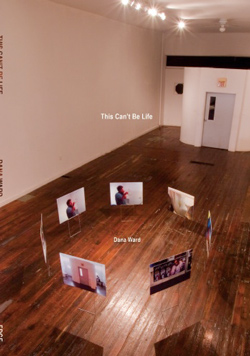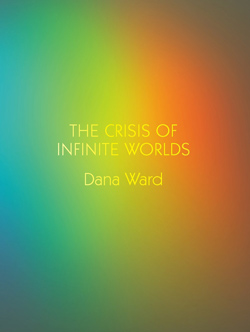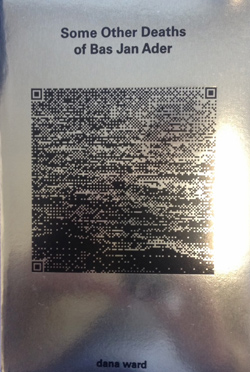


Reviewed February 1, 2014 by Matt Longabucco.
All the Hits Played Loud: Three Books by Dana Ward
“The writer invents assemblages starting from assemblages which have invented him, he makes one multiplicity pass into another.”
—Gilles Deleuze
Towards the end of his long poem “The Squeakquel,” Dana Ward, considering his own trajectory alongside that of Alvin, Simon, and Theodore, realizes that as he approaches the end of both poem and book, his second (The Crisis of Infinite Worlds), he is going to have to find a way to strike a note of “existential uncertainty” rather than reach “too happy an ending.” The reason, he guesses, is that he is writing a trilogy, a structure well known for putting impossible pressure on second volumes that too often find themselves trapped playing out the initial conditions they inherit, and therefore existing in self-imposed exile from the kind of non-linear time and non-narrative expectations that often let a first installment surprise us. Now, committed in some respects to a set of concerns and strategies, the trilogy (if there really is one), seems already sealed up by its own expectation: “Sometimes I sit in the chair that faces one of our bookshelves & look at the box set of Proust, all silver & tall, & it’s like staring at the Twin Towers except there are three of them, sitting there, waiting to be cracked.” Ward loves Proust, but his identification of novels with doomed towers encapsulates perfectly the way in which the latter’s destruction remains a fraught and still-unsayable emblem of not just human tragedy but also a turning away from capitalist triumphalism only a lunatic couldn’t in some sense recognize as necessary. Grand gestures beg fitting ends.
If these three books are a trilogy—if it’s worth thinking of them that way—that’s partly for the simple reason that Ward has written them in relatively quick succession and that they simultaneously trace literal arcs while enacting an intellectual adventure of great compression and scope. Literally, This Can’t Be Life contains a pregnancy; The Crisis of Infinite Worlds a birth; Some Other Deaths of Bas Jan Ader a seeming-offhand entry into bureaucratic personhood for Ward’s daughter (the poem begins with a trip to get a copy of her birth certificate to establish her as a dependent for an employer’s records). This mundane/miraculous progression doesn’t really matter (they’re not “domestic”), and yet it totally does (they are domestic, or forget the stupid category already). What the books, considered as a trilogy, really offer is a larger sense of courage, the courage to boast (sure) and declare love for the world but then, also, to have to actually love it in all its true and truly chaotic becoming and persisting.
That’s an ambitious project, a Romantic one, even, and Ward is a Romantic, in a time when the old dream got seductive again: new century, new drugs, ascendant feminism, the internet, hip hop—a fullness almost there for the taking, with failure of course guaranteed. Ward, besotted with connection and completion, permeable and hyper, stretches almost to burst while he waits for his wife to go into labor at Christmastime:
I went outside, smoked again, continued to erode. Where did I think I was going? This feeling of disappearing scared me. My mind was evanescing, turning from armor to ball gown, from ball gown to sun dress, from sun dress to t-shirt then a sock that caught fire and sizzled away, leaving only enervating smoke that circulated fitfully between all extant worlds. I went back inside to find Sarah watching TV. She asked me to sit down and watch with her awhile. The Wizard of Oz was on. I watched for a moment or two & felt canceled by its utter completeness. It seemed, at some level, to include, through implication or appearance, all of reality.
I love that word, “canceled,” with its echoes of television-schedule calamity or numismatic melancholy that threaten the inability to keep making meaning through show or letter, art or friendship. Yet Ward’s communities buoy his sense of the multifarious possible: if one poet can articulate all this, what might all the poets do? Meaning piles high, between us, as it simultaneously accumulates in objects, and Ward doesn’t panic, though he sometimes needs a smoke. His favorite texts are all overdetermined ones. Elsewhere, considering “Over the Rainbow”:
I started thinking about how the producers of The Wizard of Oz tried to excise Judy Garland’s rendition. The song was too big & operatic for her. She was supposed to be playing a child after all the role of Dorothy had been marked for Shirley Temple. They said the song was ridiculous, both too hopeful & too maudlin, it made the story drag, created narrative distortion, blemished Dorothy’s phony innocence, exhausted allegorical resource by calling forth a place that is decidedly more wonderful than Oz.
But what’s wrong with blemishing phony innocence? (Disfigure it!) And why be afraid of exhausting allegorical resource, of letting there be both Oz and the land over the rainbow? (You can’t exhaust it.) And why should DC comics create their series, Crisis on Infinite Earths, with the express purpose of clearing out decades worth of storylines and characters that had become so byzantine the writers had been obliged to invent parallel dimensions and timelines even the most avid fan couldn’t keep straight? Why, even, be afraid of a bedbug infestation in one’s hospital room, despite or because of new baby in hand?
I had a romantic epiphany about the bedbugs. I thought of them as angels who incarnated the void. They were determined to perform the abyssal core we can’t seem to embrace or assuage, despite our efforts. They were a formalized episteme of nothingness for me. They could devour the scene of one’s life but their necrotic feeding didn’t even offer the sacrificial permanence of scarring, or the viral horror of blood borne disease. They were the ‘spirit that lives only to nag’, new love endowed with apocalyptic powers. Every part of me admitted them because they seemed so clear & so outside the loops of cheap affection. I needed this absurd love, total & complete, free of all finesse & delectation.
Again, no “cheap affection,” as no “phony innocence,” earlier. Those original Romantics were pretty hardcore, too. As Ward reminds himself, “Anything can be a convention/even (especially) love.”
Still, I don’t want to give the impression that Ward is rehashing some old-hat hero’s journey. The “I” of these books is fully interrogated, fully erased and self-erasing. Except the act isn’t pedagogical—these poems don’t instruct us in theoretical positions we well know or, indeed, suffer—but rocks lively, even in its confusion or occasional despair. If anything, Ward is highly attuned to his status as abject desiring subject, marginalized and occluded citizen-consumer, dispersed and spectral cybernaut. His gambit, in the face of this, is the opposite of the habitual attempt to militate out the traces of those debasements, or just cavort in their ironic froth. He knows, instead, that all he has to reckon with—to reckon his way back to personhood—is: everything that ever happens to him. And then: his ability to see it, connect it, let it proliferate, breathe, play (as Brett Price once told me, Dana “shows his work”). Here’s his meditation on Google Earth:
Because the panoptic is so second nature I take my occasional shrug in its direction as a sign I’m easily intimidated by anything that’s been completely naturalized. When I examine this passivity it startles me awake once I really feel the coldness it contains. The power of complete acquiescence is that awe & defeat become confused with one another so you’re never far removed from a kind of awful glory, & can ruminate at least on this glory & exchange these ruminations with friends.
It strikes me that an inability to believe in one’s art’s power to transform unfathomably large and pervasive institutional dehumanizing forces into small, exchangeable tokens of human awareness would be a pretty hopeless position—one most poets, I pray, refuse to occupy. As Ward says, “the representational logic of hegemony makes gratitude & praise a difficult (but necessary) tradition to pursue in contemporary writing.” He just has a whole lot of stomach for this, a lot of energy, moxie, sugar, cigarettes, pizza, pot, pills, beer, sushi, radio, YouTube, pals, books, vocabularies, voices.
And everything’s permitted. If I seem to have been quoting mostly prose, it’s because these books move with bracing disregard between lineated verse and pages of blocky text. The distinction is ostensibly begged in the first poem of the first book, where at the end of a reading an audience member approaches Ward to inform him that his writing “wasn’t poetry” thanks to its apparent formal messiness. Ward argues gamely, a bit, with this “announcement from Parnassus,” but really can hardly be bothered—after all, he’s just been telling us that his drive from the airport, trip to the bookstore, dinner with the other reader and hosts were all themselves poems, and all part of the ongoing poem of the journey. Looked at that way, poetry’s far larger than the particular syntactical or typographical vagaries of any given utterance. If Jay-Z’s line, “This Can’t Be Life,” appropriated as the first book’s title, is at one level a critique that levels whatever we point it at, it is also a lament in which the “this” self-reflexively names the condition of song as limited. But that’s okay—it also reminds us the poem seeks to act as nothing less, or ought not. Life’s a mess, art its pale and benighted mirror, except—Proust again—when it transmutes life into that heady, rarefied, or diamond-hard substance we hope deserves to be called a poem.
There’s a danger in facility, of course, the risk of a Garland-esque flirtation with the maudlin in every wide embrace. Towards the end of Some Other Deaths, Ward glimpses his dark double, a slick “champion,” “waiting in line at a food truck,” in love with his own radiance reflected back at him from a frictionless urban landscape whose richness and riches he regards as a seamless extension of his own satisfaction, a little drunk, skipping from gallery to afterparty to neon-lit kiss, having successfully “contrived the most contemporary consciousness.” This double has “eradicated cruel & hierachical attachment,” and notices that when he drifts off to sleep, “Having vanquished irreconciliation, murdered elsewhere, & raised satisfaction to a masterwork gestalt, the mind, once beset by low drives & frantic detail, has no need of dreaming of all.” There again rises the specter of that too-happy ending, terrifying and false, the heart of the danger in lyricism and self-dramatizing even for the poor, humble singer. But the image shifts:
But this night
has no correlate
whoever is walking there
is in that moment
unknowable exactly
as they are
abiding worthless
value moving free through
false acquittal poised
perhaps somewhere in the populated
middle if this night that’s fallen
is familiar as it seems
a drop or crash of
life had stood a loaded
all the hits played loud
as fuck the depths
blessed with cosmetics
& drugs like
authentic emotions.
Are they mine?
Here Ward earns the end of his trilogy, still searching for a personhood “where nothing’s/inherent but something/inheres,” a bit more inevitably dejected, by book three, watching a new ‘nother life take shape in all its paradoxical relation to what is and isn’t really ours to celebrate.
How does he manage to still err way over on generosity’s side? The effort’s stunning; it makes light; rainbows; they’re everywhere in these books; he chases them; we should follow.